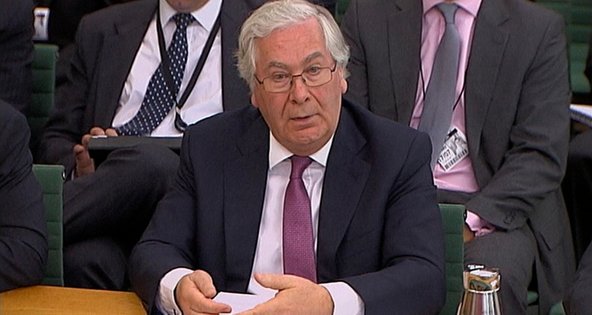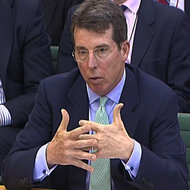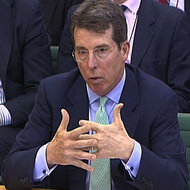 ReutersMervyn A. King, governor of the Bank of England, addressed a parliamentary committee on Tuesday.
ReutersMervyn A. King, governor of the Bank of England, addressed a parliamentary committee on Tuesday.
8:05 a.m. | Updated
LONDON – Senior British officials said on Tuesday that they did not receive warnings from the Federal Reserve Bank of New York about possible rate-rigging during the financial crisis of 2008.
Speaking to a British parliamentary committee on Tuesday, Mervyn A. King, governor of the Bank of England, said discussions with American authorities had instead focused on ways to improve the London interbank offered rate, or Libor.
Timothy F. Geithner, who then ran the New York Fed, sent an e-mail to Mr. King in June 2008 that outlined reforms to the Libor system. They included recommendations that British officials “strengthen governance and establish a credible reporting procedure” and “eliminate incentive to misreport,” according to documents released last week.
Mr. King said the correspondence with Mr. Geithner, who is now the United States Treasury secretary, did not represent a warning about potential illegal activity related to Libor.
“At no stage did he or anyone else at the New York Fed raise any concerns with the Bank that they had seen any wrongdoing,” Mr. King told the parliamentary committee on Tuesday. “There was no suggestion of fraudulent behavior.”
Mr. King also provided additional detail about his discussions with Mr. Geithner concerning Libor.
The two men met in Basel, Switzerland, in May 2008 during a regular meeting of central bankers from the world’s leading economies. During a conversation, Mr. King said he had asked Mr. Geithner to submit suggestions about potential changes to the Libor system, according to Mr. King’s testimony on Tuesday.
The discussion was followed by several phone calls between Paul Tucker, deputy governor of the Bank of England, and William C. Dudley, the current president of the Federal Reserve Bank of New York, who was the executive vice president of its markets group at the time of the discussions.
Mr. King said the New York Fed did not share internal memorandums, which questioned whether international banks were accurately reporting their Libor submissions. American authorities began collecting information as early as 2007 about potential problems with the rate-setting process.
“Our contacts at Libor contributing banks have indicated a tendency to underreport actual borrowing costs,” New York Fed officials wrote in one of the memos, “to limit the potential for speculation about the institutions’ liquidity problems.”
Mr. King said some of the recommendations about changes to Libor that Mr. Geithner had sent in 2008 were included in a report by the British Bankers’ Association, the trade body that oversees the rate. The industry association released a review in late 2008 that outlined changes to the Libor process.
“At no stage did the New York Fed express any concerns about the final outcome,” Mr. King told the parliamentary committee.
Senior British officials said they did not believe the New York Fed’s recommendations were a warning that Libor was being manipulated, according to Mr. Tucker of the Bank of England, the country’s central bank. Suggestions from American authorities included how to “eliminate incentive to misreport” Libor submissions, as well as expanding the number of international banks that participated in the rate-setting process.
The recommendations “didn’t set off alarm bells,” Mr. Tucker said on Tuesday.
Mr. Tucker’s role in the rate-manipulation scandal was again questioned after new e-mails were released on Tuesday that detailed his discussions with Robert E. Diamond Jr., former chief executive of Barclays.
Documents from Barclays and government authorities show that the Bank of England official called Mr. Diamond in October 2008 to discuss the firm’s funding position at the height of the financial crisis. Regulators said Jerry del Missier, a top Barclays executive, later misinterpreted that conversation as an instruction from the British central bank to lower the firm’s Libor submissions.
The new e-mails released by the Bank of England show that Mr. Tucker had written to Mr. Diamond about Libor as earlier as May, 2008.
The documents also illustrate a close relationship between Mr. Diamond and the government official. After it was announced that Mr. Tucker would become deputy governor of the Bank of England in December 2008, Mr. Diamond e-mailed to congratulate him: “Well done, man. I am really, really proud of you,” Mr. Diamond wrote.
Mr. Tucker was equally friendly in his response. “Thanks so much Bob. You’ve been an absolute brick through this,” he said in an e-mail reply.
British lawmakers also questioned the senior officials on Tuesday about the steps that led to Mr. Diamond’s resignation this month. The British bank agreed to a $450 million settlement in June in connection with the manipulation of Libor.
Two days after the settlement was announced, Adair Turner, chairman of Britain’s Financial Services Authority, talked to Barclays’ chairman, Marcus Agius, about whether Mr. Diamond was the right person to lead the bank.
The Financial Services Authority had previously raised concerns about the bank’s corporate culture, and Mr. Turner said there were questions about whether Mr. Diamond was the most appropriate individual to lead the changes in governance inside Barclays.
The conversation was followed by a discussion between Mr. King and Mr. Agius on July 2, during which Mr. King said Mr. Diamond no longer had the support of the Financial Services Authority.
After the discussion, Mr. Agius held a conference call with the bank’s nonexecutive directors, who decided to ask Mr. Diamond to resign.
“If Bob Diamond had stayed on,” Mr. Turner told the parliamentary committee on Tuesday, “I strongly suspect that it would have been to the disadvantage of shareholders as well.”
Article source: http://dealbook.nytimes.com/2012/07/17/bank-of-england-chief-denies-n-y-fed-gave-warning-on-rate-rigging/?partner=rss&emc=rss

